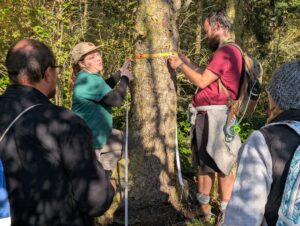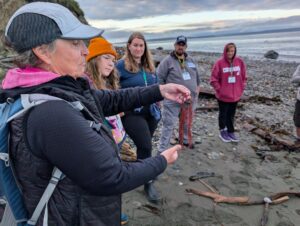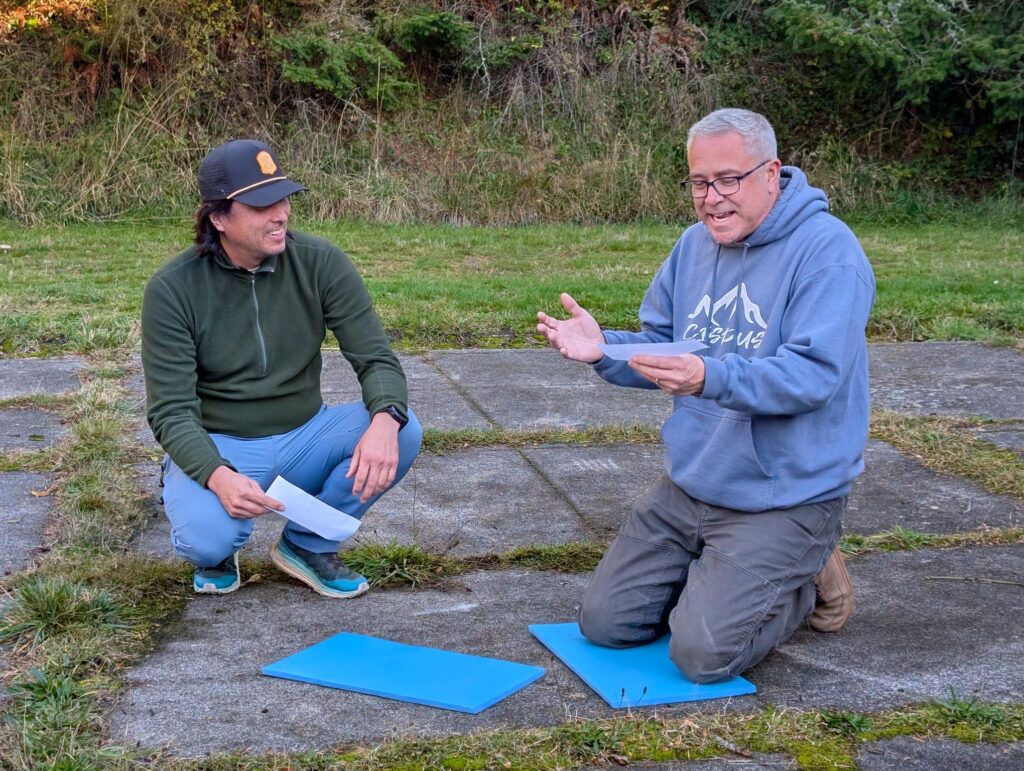The pigeon guillemot took center stage at the October Outdoor School Washington (OSWA) training on Whidbey Island. Described by The Cornell Lab as ‘an attractive auk with velvety dark brown plumage,’ the bird was celebrated in dance, drawing, and skits.
“Throughout the week, the pigeon guillemot kept getting mentioned in different ways,” says Lydia Geschiere, PEI’s East Sound FieldSTEM Coordinator. “People made up silly bird dances as a team, and it came up as part of our carbon cycle conversations. We were talking about the history of Camp Casey and where we see evidence of climate change. The pigeon guillemot is part of that ecosystem and their populations are showing evidence of climate impacts.”

Dozens of educators connected with outdoor school leaders for a hands-on opportunity to learn the Characteristics of a High-Quality Outdoor School Program. Many were returnees, greeting their counterparts from throughout the state like long-lost friends, while others were brand new to the program. “It was nice to see people again and hear what they’ve been doing so we can keep supporting them where they’re at,” says Geschiere, “and then there are new folks and new relationships.”
The week was funded through OSPI’s Outdoor Learning Grant program. OSWA coordinated the workshop, and other sessions were led by OSPI staff, OSWA staff and the University of Washington.
PEI’s team played several roles throughout the week, including leading the action planning process, cabin groups, a culturally responsive outdoor learning session and a three-hour “hike.” Most participants attended with a team. Kathryn Kurtz, Executive Director of PEI, led three sessions on action planning, where participants used the Characteristics of a High-Quality Outdoor School as a guide. Kurtz noted, “Teams set their intentions for their time at camp on the first day, participated in activities, revised and developed action plans throughout the week, and each team left with a plan for their next steps upon returning home.”
“It’s such a joy. Because you have almost four full days with a group of people learning together, everybody can lean on each other and you can dig in more deeply. It becomes transformative learning.”
— Lydia Geschiere, East Sound FieldSTEM Coordinator
Cabin groups met every morning to build community and replicate what students would experience. Each group created group names and dances as well as community agreements, designed and performed a skit, and reflected on their experience during the last day. “We gave them examples of strategies for deepening the experience for students through cabin groups and building trust,” Geschiere explains.
Under the coordination of PEI’s Northwest FieldSTEM Coordinator Amy Keiper, PEI staff led four groups of hikers in a three-hour outdoor learning

experience where participants explored the carbon cycle through the question, ‘How do trees get their mass?’ They also discovered how learning standards could be embedded in outdoor learning and the importance of spontaneity and flexibility.
“A big piece of this hike is relationship-building with the world around you,” Geschiere maintains. “It’s seeing what nature has to offer that day, and that’s part of the magic of the experience.” Her group found an apple tree, which prompted a conversation about the carbon cycle in apples. “We were having this conversation while we ate these apples, and they were so good,” she says. “That was not anything we planned. It’s a way to explore and imagine and get excited.”
Greg Barker is the Managing Director for the Washington State Principals’ Education Foundation, which oversees Cispus Learning Center, an outdoor school that has hosted previous OSWA training weeks.
“Educators who take part in immersive outdoor school experiences gain so much more than just knowledge—they grow as thoughtful, creative professionals,” says Barker. “Investing in this kind of professional growth doesn’t just benefit the staff—it enriches their students’ learning and strengthens the entire school community.”
